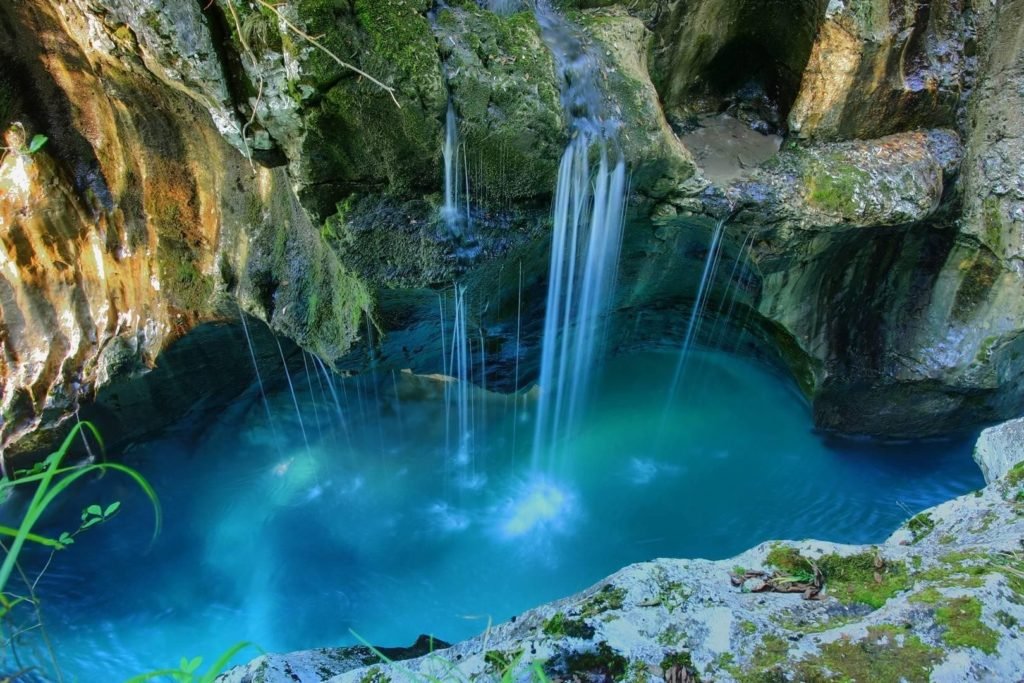
Pripovedke o treh rekahTales about rivers have a special place in Slovenian tradition. They reflect the fondness the Slovenian people feel towards their rivers and also the gratitude for the prosperity they bring.
The Tale of River Drava
It happened long ago, when our ancestors as yet had no knowledge of rye and wheat. In those days a wealthy fisherman lived by the river Drava. He had acquired all his wealth by catching fish in the river Drava. Grateful to the river, he asked one day:
"Mother Drava, how can I repay you, for giving me such prosperity?"
Drava gave him this answer:
" Go far into the world. In a place far from here you will find people, who have white bread and rye bread. Buy a loaf of each and bring them back to me!"
The fisherman went on his way and came to a wealthy and beautiful country. People ate something that he did not know till then – lovely bread. He bought two loaves, just as Drava had requested. When he returned, he threw a loaf of wheat bread and a loaf of rye bread into the Drava. – Then the river started to swell and soon covered the left and the right banks. When the water receded, the earth began to sprout and grow beautiful rye and yellow wheat.
So it was that the people had the seed and began to sow rye and wheat.
Pravljica o Dravi
Bilo je v tistih časih, ko naši pradedje rži in pšenice še niso poznali. Tedaj je živel ob Dravi na Koroškem zelo bogat ribič. Vse svoje premoženje si je pridobil s tem, da je pridno lovil ribe v Dravi. Poln hvaležnosi je nekega dne vprašal Dravo:
"Mamica Dravica, s čim naj ti povrnem, ker si mi pomagala do blagostanja?"
Drava je na to odgovorila:
"Pojdi daleč po svetu. Tam v daljnjem kraju najdeš ljudi, ki imajo bel in ržen kruh; od vsakega mi po en hlebec kupi in mi ga prinesi!"
Ribič se je odpravil na pot in prišel v bogate in lepe kraje. Ljudje so tam jedli, česar on ni dotlej poznal: lep kruhek. Kupil je dva hleba, kakor mu je Drava naročila. Ko se je vrnil, je vrgel hleb pšeničnega in hleb rženega kruha v Dravo. – Nato je začela Drava naraščati in je poplavila ves levi in desni breg. Ko pa je voda odtekla, je pričela zemlja odganjati lepo rž in rumeno pšenico.
Tako so ljudje dobili seme in povsod so začeli sejati rž in pšenico.
Drava, Sava and Soča
Drava, Sava and Soča are sisters. Once upon a time they were talking and wondered, which one would be the first to reach the sea the following day. In the evening Sava and Soča fell asleep. Drava pretended to sleep, then started to quietly flow on. When Sava awoke in the morning, she noticed that Drava was already rolling towards the sea. So she angrily started to run briskly. Soča was the last to awaken. When she realized how the sisters had tricked her, she crashed with great force through the mountain walls, raged through rocky gorges and arrived first in the sea. And so it is to this day. Drava rolls along quietly and secretively, lively Sava rushes on, but both are watering the Black sea. Soča however speedily thunders through narrow gorges of Goriška mountains into the Adriatic Sea. And this is the origin of the folk saying: Drava broke its way along the valley, Sava spread out on the plain, Soča winds its way towards the south.
Drava, Sava in Soča
Drava, Sava and Soča so sestre. Nekdaj so se menile, katera bo prihodnji dan pritekla prva v morje. Zvečer sta Sava in Soča zaspali. Drava pa se je potuhnila in kmalu začela tiho teči naprej. Ko se je Sava zjutraj prebudila, je opazila, da se Drava že vali proti morju. Zato se je tudi sama jezno spustila v uren tek. Nazadnje se je prebudila Soča. Ko je videla, da sta jo sestri ukanili, je predrla na nasprotni strani s silovito močjo gorske stene, se srdito zagnala skozi skalnate soteske in dospela prva v morje. In tako je še danes: Drava se vali tiho in potuhnjeno, bistra Sava dere, a obe napajata Črno morje, Soča pa urno bobni skoz ozke skalnate struge goriških gora v Jadransko morje. In odtod narodni pregovor: Drava se je po dolini vdrla, Sava je vodo po ravnini vsula, Soča se pa proti jugu suče.
Bibliography: Jakob, Kelemina, et al., Bajke in pripovedke slovenskega ljudstva, Studio RO, Humar, Bilje, 1997
Translated into English by Aleksandra L. Ceferin
